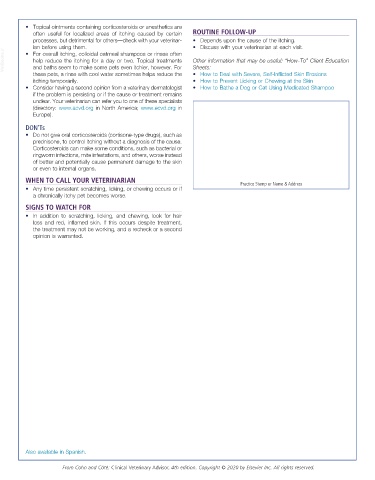Page 3118 - Cote clinical veterinary advisor dogs and cats 4th
P. 3118
• Topical ointments containing corticosteroids or anesthetics are
often useful for localized areas of itching caused by certain ROUTINE FOLLOW-UP
processes, but detrimental for others—check with your veterinar- • Depends upon the cause of the itching.
ian before using them. • Discuss with your veterinarian at each visit.
VetBooks.ir help reduce the itching for a day or two. Topical treatments Other information that may be useful: “How-To” Client Education
• For overall itching, colloidal oatmeal shampoos or rinses often
Sheets:
and baths seem to make some pets even itchier, however. For
these pets, a rinse with cool water sometimes helps reduce the • How to Deal with Severe, Self-Inflicted Skin Erosions
itching temporarily. • How to Prevent Licking or Chewing at the Skin
• Consider having a second opinion from a veterinary dermatologist • How to Bathe a Dog or Cat Using Medicated Shampoo
if the problem is persisting or if the cause or treatment remains
unclear. Your veterinarian can refer you to one of these specialists
(directory: www.acvd.org in North America; www.ecvd.org in
Europe).
DON’Ts
• Do not give oral corticosteroids (cortisone-type drugs), such as
prednisone, to control itching without a diagnosis of the cause.
Corticosteroids can make some conditions, such as bacterial or
ringworm infections, mite infestations, and others, worse instead
of better and potentially cause permanent damage to the skin
or even to internal organs.
WHEN TO CALL YOUR VETERINARIAN Practice Stamp or Name & Address
• Any time persistent scratching, licking, or chewing occurs or if
a chronically itchy pet becomes worse.
SIGNS TO WATCH FOR
• In addition to scratching, licking, and chewing, look for hair
loss and red, inflamed skin. If this occurs despite treatment,
the treatment may not be working, and a recheck or a second
opinion is warranted.
Also available in Spanish.
From Cohn and Côté: Clinical Veterinary Advisor, 4th edition. Copyright © 2020 by Elsevier Inc. All rights reserved.

